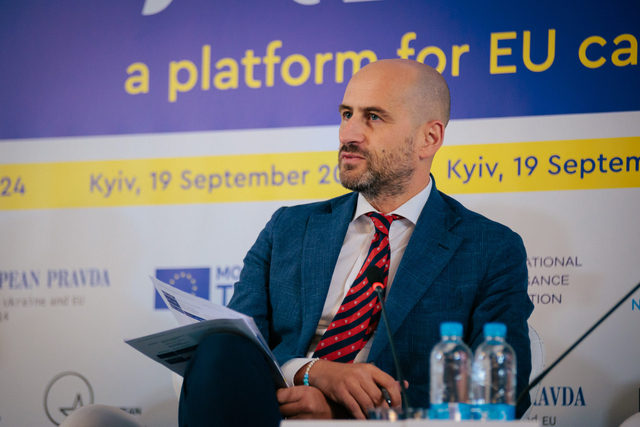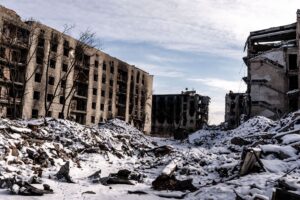
Arturo Varvelli, Head of the Rome Office and Senior Policy Fellow of the European Council on Foreign Relations (ECFR), is one of the few Italian experts on foreign affairs who have visited Ukraine. In September 2024, he was in Kyiv, as a guest of the New European Center, to discuss Ukraine’s possible accession to the EU.
How does Italy see Ukraine now?
JOIN US ON TELEGRAM
Follow our coverage of the war on the @Kyivpost_official.
I must admit that from Kyiv, the discussions in Italy on the limitations on the use of Western weapons to strike military targets outside Ukraine appear even more surreal. A population facing constant alerts (especially at night) for missile or drone attacks from Moscow struggles to understand why we (Italians) confuse peace with surrender to violence.
How actively is Europe involved in shaping the framework for potential peace negotiations in Ukraine?
European leaders know that they cannot afford to be passive. Recognizing that Ukraine’s security is inextricably linked to Europe’s own, they understand that supporting Kyiv strengthens their position and represents an investment in continental stability. However, the extent to which Europe can be effective inevitably depends on its room for maneuver – which we know to be limited. In this context, the Coalition of the Willing meeting, like the Aug. 18 meeting in Washington, underscored two critical points.
First, the security guarantees that Europe is striving for to discourage further Russian aggression are meant to become operational only after a ceasefire is reached. This means that European leaders must continue prioritizing ceasefire efforts.
Other Topics of Interest
NATO on High Alert as Russian Drone Violates Romanian Airspace
Condemnation from Kyiv to Bucharest is swift, as leaders stress the importance of a unified response and warn that Russia’s ‘reckless behavior’ threatens regional stability.
Second, these meetings made clear that these guarantees require the United States’ support. Given Trump’s inconsistent position and Europe’s internal cohesion problems, it is thus uncertain whether a coordinated European security framework for Ukraine will emerge, even if a ceasefire solution is found.
One thing is certain: protecting Ukraine’s security and enhancing its defense, European integration, and domestic stability are in the interests of both Europeans and Ukrainians.
Do European leaders present a unified approach, or are there significant divisions between member states?
This is the other side of the coin. While European leaders recognize the need to invest in security and defense, as well as strengthen Ukraine’s diplomatic, military, and financial positions, they have yet to present a unified approach. Aside from the most prominent dissonant voices – Hungary and Slovakia – divisions across the continent run deeper, especially when it comes to the question of deploying troops to Ukraine after a potential ceasefire. While France and the UK, co-chairs of the Coalition of the Willing, along with Belgium, Lithuania, and Estonia, are in the “yes” camp, key states like Germany, Italy, and Poland have voiced concerns.
Beyond deployments, and perhaps even more importantly, European leaders still lack a long-term strategy to stabilize Ukraine, strengthen Kyiv against ongoing hybrid threats, and consolidate its European path. At ECFR, we have tried to outline such a plan, recommending, for example, that Europeans should promote the extensive use of the newly established NATO Ukraine Council (NUC), which gives Ukraine access to a wide range of NATO activities as the alliance’s closest partner.
If Europe is to establish itself as a credible security actor, the expansion of its defense industry is crucial.
How has the Russian invasion reshaped Europe’s concept of security?
For Europe, Russia’s full-scale invasion of Ukraine was perhaps the harshest, yet necessary, wake-up call. It is now clear that Europe cannot hope to stand apart from global security challenges and must address what has long been left undone. The invasion exposed serious gaps in preparedness and the dangers of relying too heavily on external guarantees, a concern exacerbated by Trump’s election, which called into question shared commitments and values across the Atlantic.
Public perception also plays a role in this: even those who still see the war as distant have felt its effects, from steep inflation and substantial financial support for Ukraine to the arrival of millions of refugees. These effects have forced European leaders to rethink long-term strategies to preserve what we have long fought for and often taken for granted: peace, high living standards, strong infrastructure, the borderless Schengen area, and more. The invasion has made clear that these achievements can no longer be assumed to be permanent but will require protection and, above all, a greater sense of shared responsibility among Europeans.
What role does the expansion of Europe’s defense industry play in long-term strategic security?
If Europe is to establish itself as a credible security actor, the expansion of its defense industry is crucial. While the 5% spending target may be partly a gesture to please Washington, it is encouraging that European countries are indeed adjusting by investing in production and the operational support of their forces. However, we must be realistic: for the time being, new purchases will largely come from the United States, as some armaments cannot yet be produced by European manufacturers.
We can surely advocate for European strategic autonomy, but there are significant constraints along the way. At the same time, it is increasingly evident that the United States is shifting its focus toward other strategic challenges, making it all the more crucial for Europeans to gradually become more independent and self-sufficient in both defense and technological capabilities.
Meloni is seeking to position Italy as a bridge between Europe and the United States on security and non-security matters.
Within this evolving European security landscape, what role is Italy seeking to play?
Italy is navigating an ambivalent security posture. The country’s prime minister, Giorgia Meloni, and her party, Fratelli d’Italia, have been identified by ECFR as one of the “challengers”: populist forces that challenge the traditional vision of Europe. Meloni prioritizes a national perspective on security in order to appeal to her domestic electorate. However, she is fully aware of Italy’s dependence on both the EU and the United States. She therefore often adopts a dual approach, engaging with and distancing herself from formal institutions simultaneously – a reflection of the non-traditional image she seeks to maintain for herself, her party and her government.
While this approach has been politically successful domestically, it carries risks at the European level as it undermines Italy’s credibility with regard to long-term European security commitments.
To offset this, Meloni is seeking to position Italy as a bridge between Europe and the United States on security and non-security matters. This helps to mitigate transatlantic uncertainties while safeguarding the country’s strategic interests. However, as seen in the EU-US trade negotiations, this approach seems to have had limited success to date.
How credible is Italy as a security actor compared to its traditional role as a diplomatic mediator?
Italy’s credibility in this area is constrained by both political missteps and public opinion. The country remains one of the lowest defense spenders in the EU, allocating just 1.54% of GDP in 2024. Although Italy has formally committed to the 5% defense target, it appears highly unlikely that this benchmark will be met, with preliminary Ministry of Economy forecasts projecting a cautious rise to 2.1–2.3%. Furthermore, according to an ECFR survey, Italy is perceived as less supportive of increased defense spending than other European countries, with only 17% in favor of an increase versus 58% opposed. Both factors reflect a broader issue: neither public opinion nor political forces fully grasp the evolving nature of the threat.
For Italy to be seen as a credible security actor while maintaining its traditional diplomatic role, its leaders and citizens must acknowledge that the pressure to increase defense spending stems not only from the United States’ demands, but rather from a changed security environment. In an era of heightened geopolitical instability, credible military capabilities are essential not only for deterrence but also to safeguard Italy’s welfare and strategic interests.
Italy has deployed in Odesa several cultural, humanitarian, economic, and even security-related projects. Why Odesa?
Rome’s interest in Odesa is rooted in cultural, historical and strategic factors. From its foundation in the 18th century by the Neapolitan nobleman José de Ribas, to the thriving Italian trading community of the 19th century, Italians have left a lasting imprint on the city’s architecture, commerce, and cultural life. Beyond these symbolic ties, Odesa is also of great strategic importance as a Black Sea port that links Europe and the Slavic world with the Mediterranean. Italy’s engagement there through reconstruction, cultural and economic projects signals active diplomacy, shaping the post-war landscape and leaving an Italian imprint on the future.
Is Italy trying to position itself as Ukraine’s key European partner on the Black Sea, similar to how Poland has a leadership role in western Ukraine?
I would say not yet. I would also argue that Italy has not yet realized the full potential of the Black Sea region for its strategic interests. The Three Seas Initiative, for example – which links northern and southern Europe through energy, connectivity and infrastructure projects across the Baltic, Black Sea and Adriatic regions – has never been prioritized by Rome. Yet Italy’s location would naturally place it at the southern end of the initiative. While Prime Minister Giorgia Meloni appears to be beginning to recognize the region’s strategic importance, joining the Initiative would solidify this understanding.
To what extent does this focus on Odesa connect to Italy’s Mediterranean strategy and its broader geopolitical ambitions?
Italy has long seen the Mediterranean as the core of its foreign policy, and the Black Sea should be treated as a natural extension of that space – geographically and strategically. If Rome wants to strengthen its geopolitical weight, it should embed Odesa within this wider Mediterranean strategy, positioning itself at the forefront of regional stability and reconstruction.
This is all the more urgent given Russia’s expansionism and Turkey’s ambiguous role in the region, which leave space for a clearer European, and Italian, line.
On the logistical side, leveraging ports like Trieste and Monfalcone to advance Adriatic-Black Sea corridors would not only support Ukraine’s exports and recovery but also reinforce Italy’s role as a connector between the Mediterranean and Eastern Europe, allowing Italy to expand beyond its traditional focus on the Western Balkans and North Africa.





